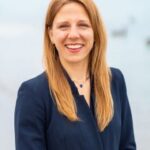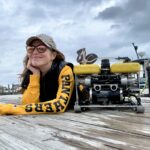
- This event has passed.
Collab Lab 65: Beyond Skills – Building Capabilities
Building the skills of individual students is fine. What more can happen if we focus on building the capabilities of a school?
The simple thing to do in school is provide instruction. Enroll, instruct, repeat. The best we can hope for in that model is that instruction gets better.
What if we had bigger aims?
What if we consciously worked to build the capabilities of students to work together to achieve a goal beyond learning the curriculum? What more can students learn about real world challenges, the broad range of folks working to address them, how to work effectively as a team, and how they can make an impact if we give them that opportunity?
The jumping off point for December’s discussion is an exploration of how underwater ROVs developed by middle and high school students might support the work of university researchers. We’ll explore capabilities around exploration, sampling, and data analysis, where we are now, and where we might go. We’ll also identify the first set of challenges K-12 teachers and students might take on in a collaborative effort to build a unique set of capabilities in Milwaukee.
Agenda
| 5:30 to 6:00 pm | Grab something to eat, meet some interesting, passionate people |
| 6:00 to 6:15 pm | Welcome and introductions |
| 6:15 to 8:00 pm | Let’s talk through how to do this |
| 8:00 to 8:30 pm | Wrap up and next steps |
Food and non-alcoholic beverages will be provided. There is no charge for participation but space is limited!
Featured Participants
Among others, you’ll have a chance to talk with:
Peter Graven — Science & Robotics, St Francis School District
 Peter teaches 7th and 8th-grade science and high school robotics in the St. Francis School District. Over the past 27 years, he has taught a variety of science and mathematics courses, including Earth and Life Sciences. Graven serves as the lead teacher and mentor for SFROBOTICS, a program that engages students in diverse robotics competitions such as FIRST Tech Challenge, FIRST LEGO League, MATE ROV, and SEAPERCH, as well as in STE(A)M projects with local and global impact, supported by strategic partnerships.
Peter teaches 7th and 8th-grade science and high school robotics in the St. Francis School District. Over the past 27 years, he has taught a variety of science and mathematics courses, including Earth and Life Sciences. Graven serves as the lead teacher and mentor for SFROBOTICS, a program that engages students in diverse robotics competitions such as FIRST Tech Challenge, FIRST LEGO League, MATE ROV, and SEAPERCH, as well as in STE(A)M projects with local and global impact, supported by strategic partnerships.
Dedicated to innovation, Graven is constantly researching new ways to inspire proactive learning. He is known for designing opportunities that encourage creative problem-solving, independent invention, and collaborative teamwork. His classroom is a hub of exploration, blending technology and active engagement to foster deep learning and skill development.
Over the past eight years Peter and his students have developed capabilities to design, build and operate underwater ROVs of increasing sophistication. They are now exploring how the ROVs they’ve built can be deployed to support hands-on learning focused on environmental science and archeology.
Marissa Jablonski – Executive Director, Freshwater Collaborative of Wisconsin
 Marissa is an accomplished water engineer, environmental advisor, and plastics-reduction expert who has worked in more than 45 countries. Her work with The Freshwater Collaborative leverages expertise across 13 University of Wisconsin institutions to lead the global community in addressing freshwater challenges, and advance its mission to:
Marissa is an accomplished water engineer, environmental advisor, and plastics-reduction expert who has worked in more than 45 countries. Her work with The Freshwater Collaborative leverages expertise across 13 University of Wisconsin institutions to lead the global community in addressing freshwater challenges, and advance its mission to:
- Create knowledge to solve freshwater challenges through collaborative research across academia in fields such as natural and applied sciences, engineering, economics, social sciences, arts, humanities and policy;
- Recruit and develop talented professionals across all freshwater disciplines through intentional structuring of curriculum, training and workplace experiences; and
- Improve the well-being of natural ecosystems and all people by applying research and training to engage and serve communities and solve freshwater challenges.
Ashley Lemke — Associate Professor – Anthropology, UW Milwaukee
 Dr. Lemke is an Anthropological Archaeologist. In addition to her role at UWM, she is the former Chair of the Advisory Council on Underwater Archaeology , and Explorers Club Fellow. Lemke is a leading researcher on the archaeology of hunter-gatherers. She has worked extensively on both terrestrial and underwater archaeological projects from the Lower Paleolithic in Europe to 19th-century Nunamiut archaeological sites in the Arctic. She is an expert on submerged ancient sites in the Americas and has researched such sites in the Gulf of Mexico, Great Lakes, and Atlantic Ocean. She has directed excavation projects in Texas and Michigan, as well as underwater projects in the Great Lakes and Atlantic Ocean, including numerous field schools. She has experience excavating at numerous archaeological sites in Europe including Germany, Spain, Romania, and Serbia.
Dr. Lemke is an Anthropological Archaeologist. In addition to her role at UWM, she is the former Chair of the Advisory Council on Underwater Archaeology , and Explorers Club Fellow. Lemke is a leading researcher on the archaeology of hunter-gatherers. She has worked extensively on both terrestrial and underwater archaeological projects from the Lower Paleolithic in Europe to 19th-century Nunamiut archaeological sites in the Arctic. She is an expert on submerged ancient sites in the Americas and has researched such sites in the Gulf of Mexico, Great Lakes, and Atlantic Ocean. She has directed excavation projects in Texas and Michigan, as well as underwater projects in the Great Lakes and Atlantic Ocean, including numerous field schools. She has experience excavating at numerous archaeological sites in Europe including Germany, Spain, Romania, and Serbia.


